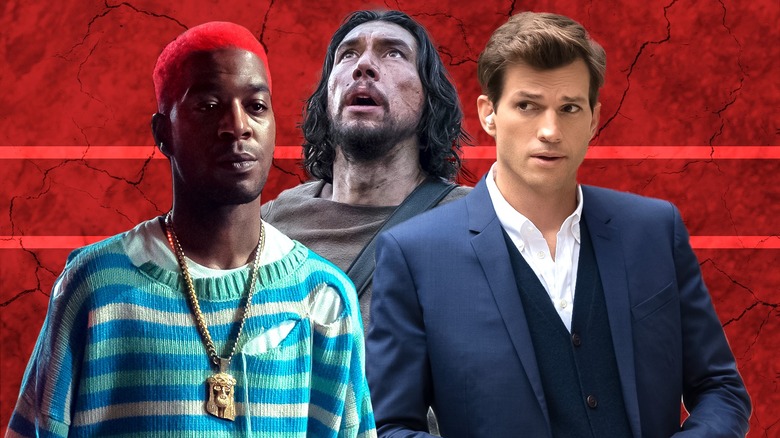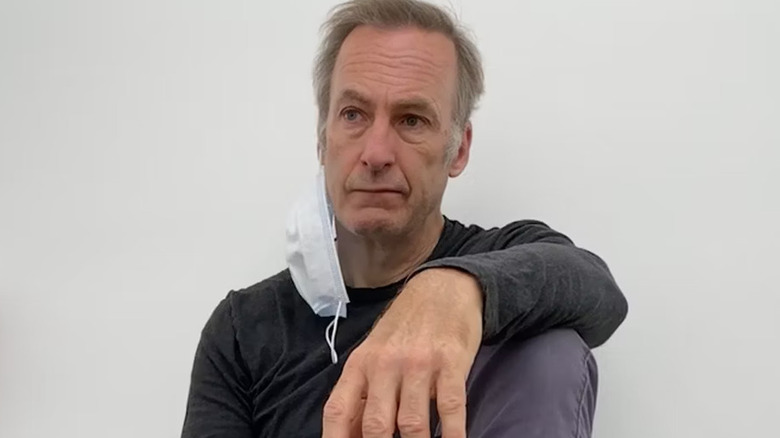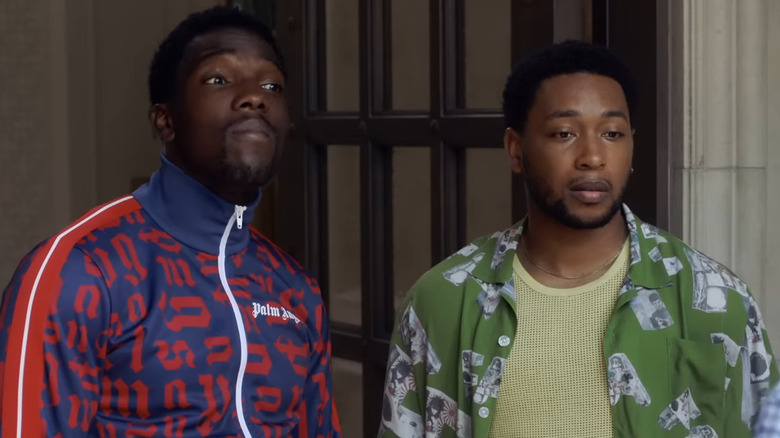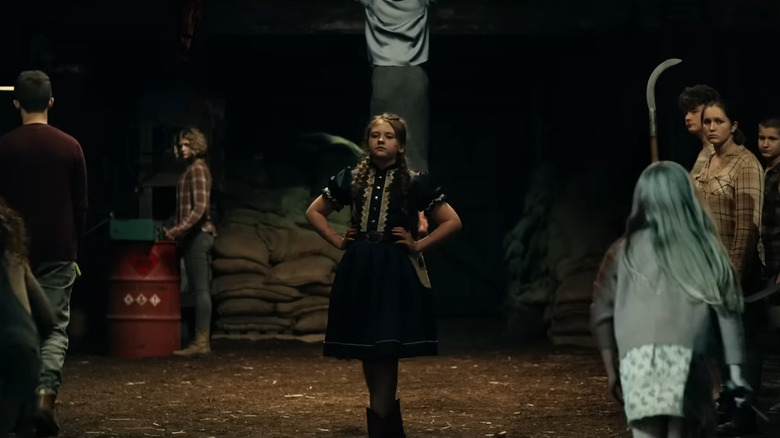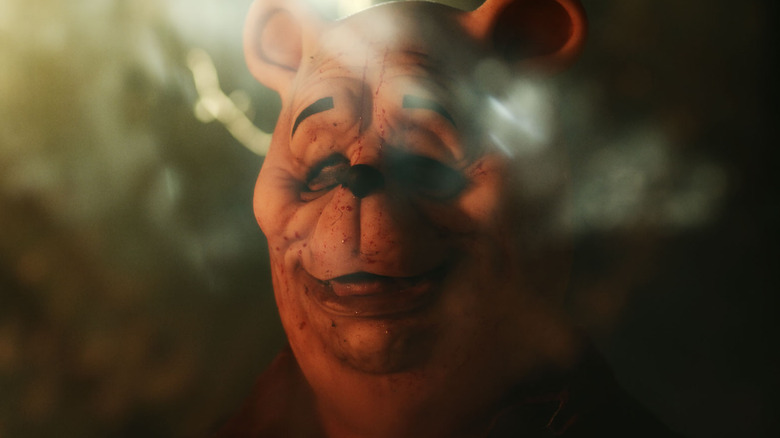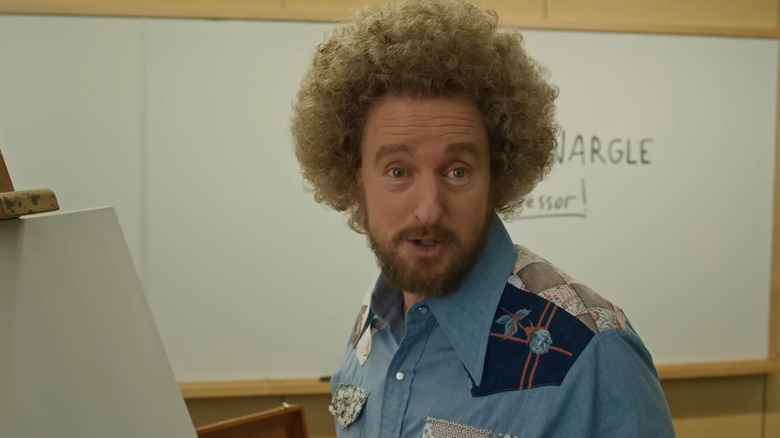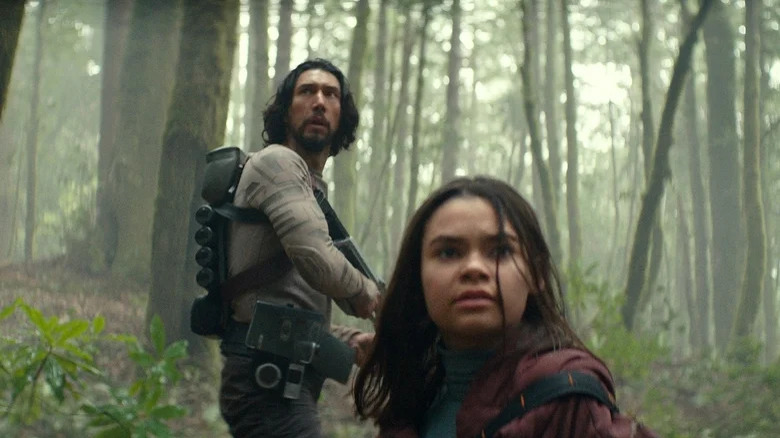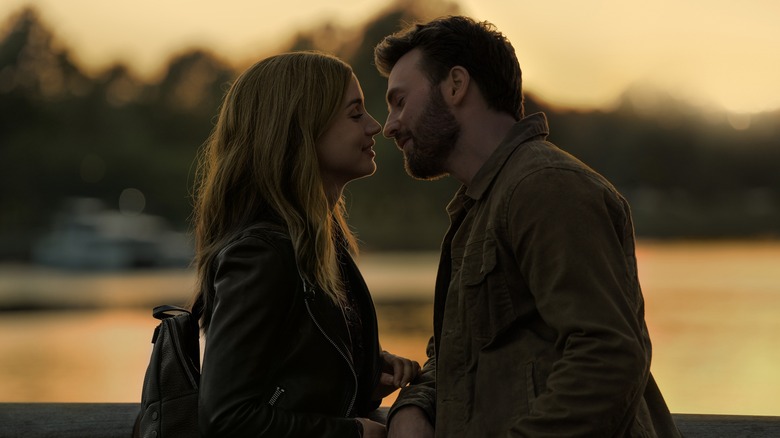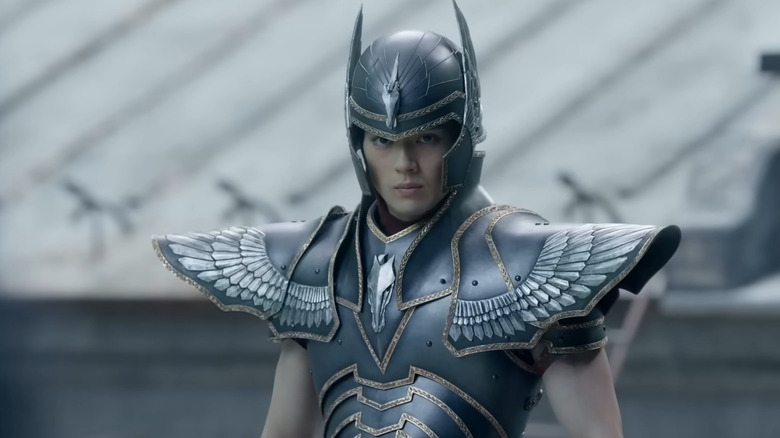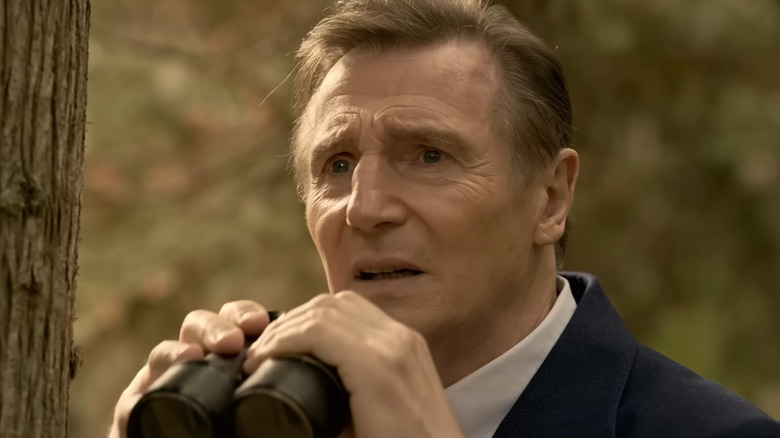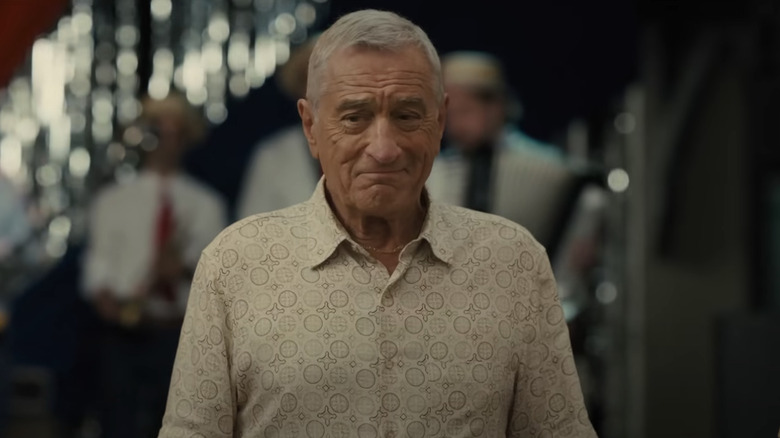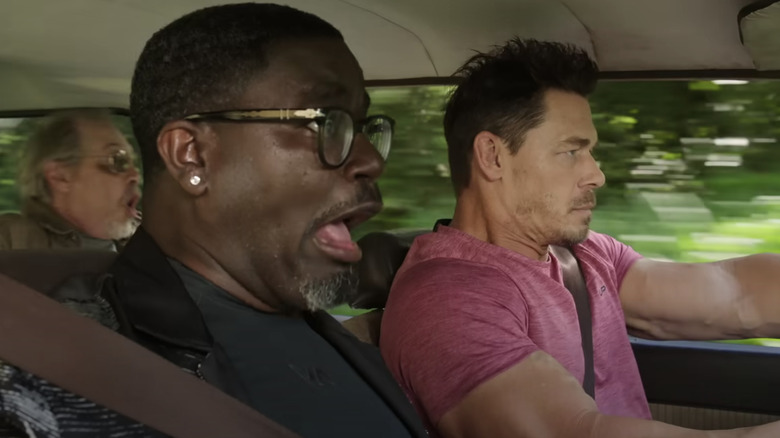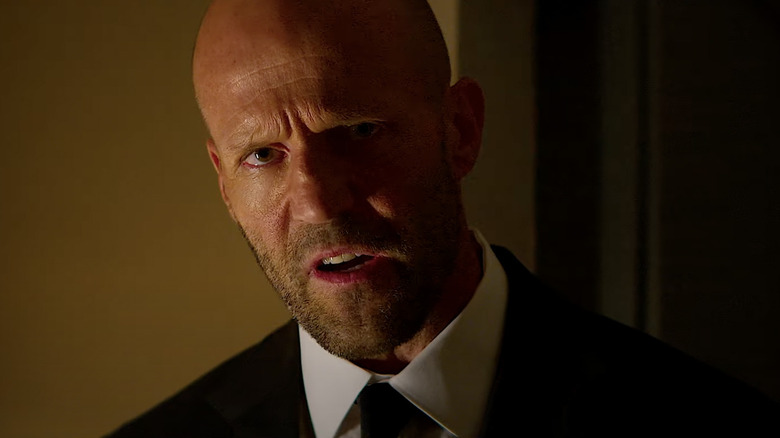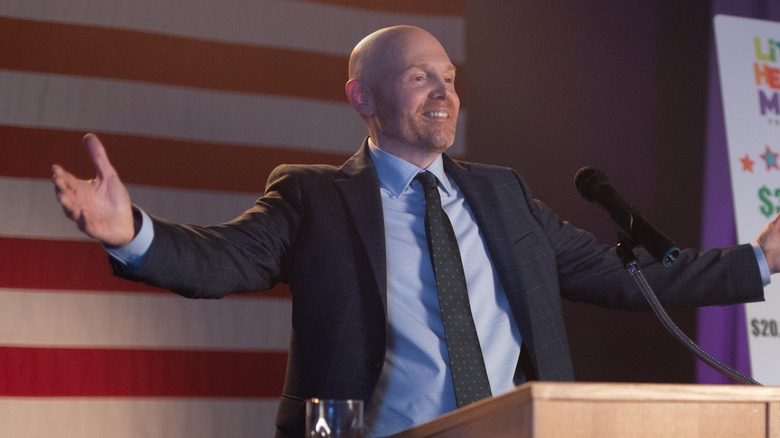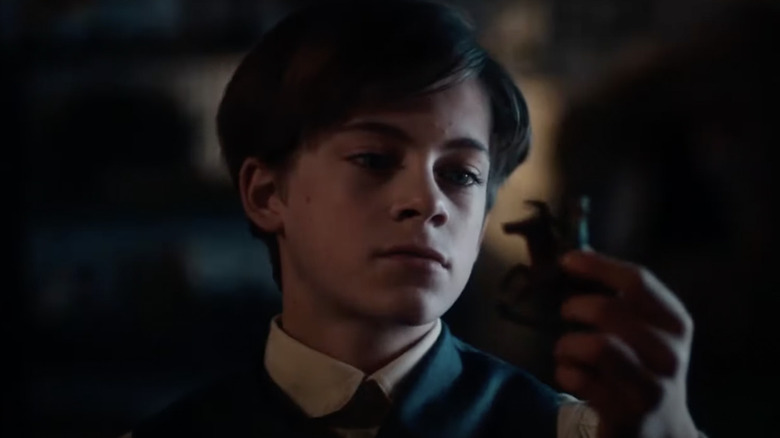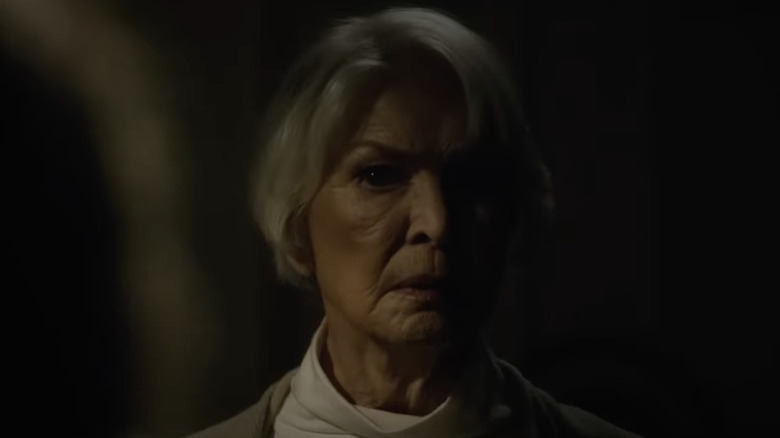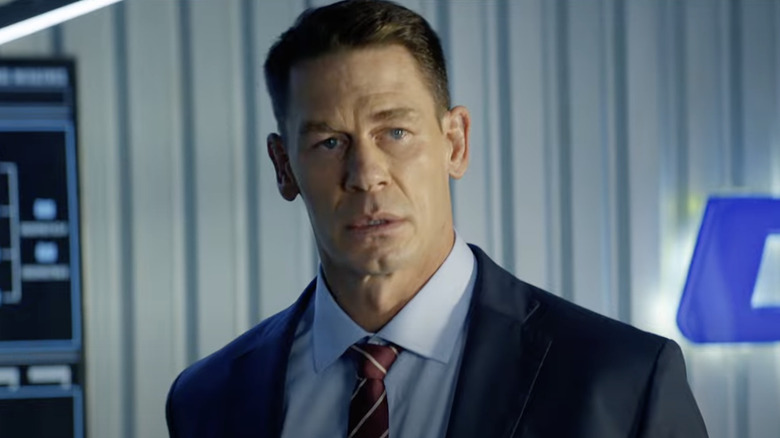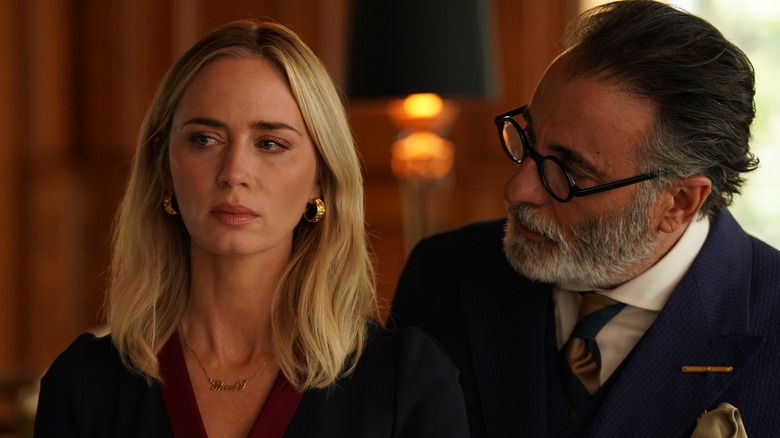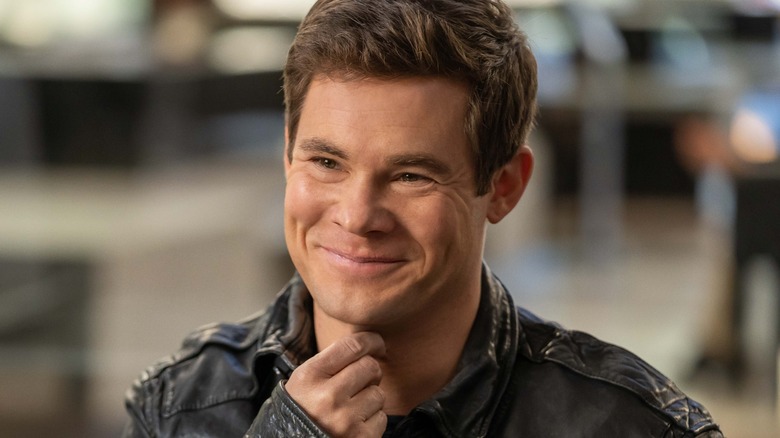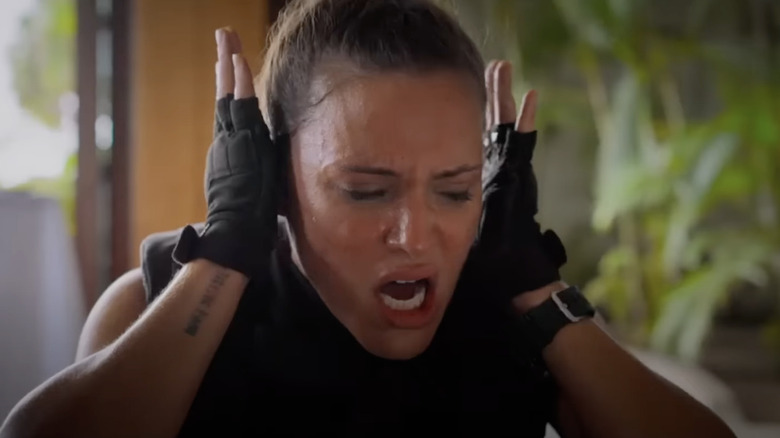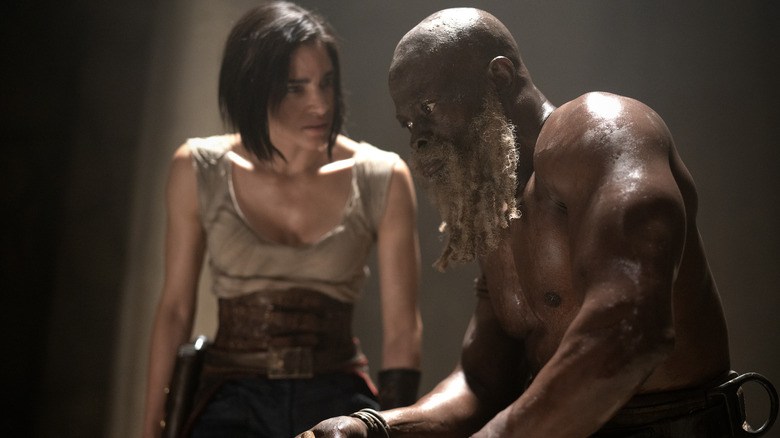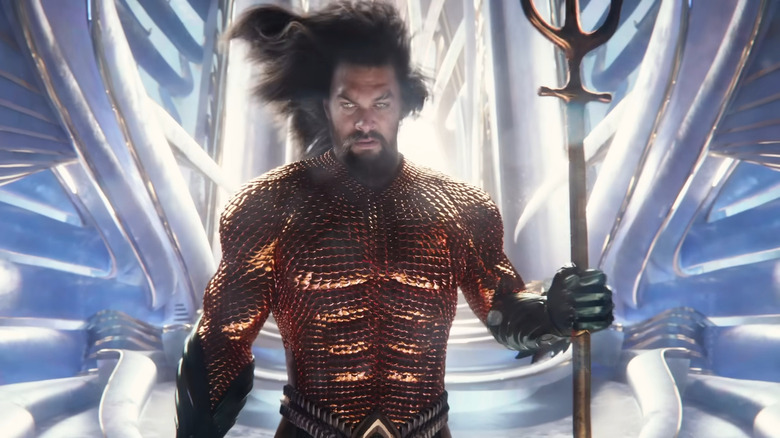The Worst Movies Of 2023
When it comes to movie options, 2023 was absolutely stacked. With dozens of streaming services offering a slew of original content, plus movie theaters slowly returning to pre-pandemic levels of attendance, film fans were given a wide variety of choices. Some movies were absolute must-sees by virtue of universal acclaim and massive box office hauls, a la "Barbie" and "Oppenheimer." Others dazzled with beautiful visuals like "Spider-Man: Across the Spider-Verse," some snagged attention through undeniably original hooks such as "Asteroid City," and others benefited from being fantastic entries in beloved franchises like "Guardians of the Galaxy Vol. 3."
But at the other end of the quality spectrum were the true stinkers. For every good movie that arrived, a few bad ones were unleashed upon the world. They confused, baffled, and angered critics with their overt terribleness while often pushing away the elusive mass audiences their makers clearly wanted to court. We're here to take a look at those disasters, from bloody takes on children's characters to heinous remakes. These are the absolute worst movies of 2023.
Updated on December 29, 2023: The year 2023 was full of bombs, and we're not just talking about Oppenheimer's creations. Here's the worst of what the year had to offer.
Life Upside Down
The world is still trying to make sense of the COVID-19 pandemic. One of the purposes of art is to unpack the emotions, lessons, and impact of shared human experiences like this. It's unsurprising, then, that a curious sub-genre of pandemic movies has developed in recent years. By and large, these somber, anxious, and surreal movies have been met with savage critical assessments. Perhaps not enough time has passed to gain interesting artistic perspective, or maybe nobody wants to relive the most painful days of 2020. Either way, movies like "Locked Down" and "The Bubble" have sunk to the bottom, and in 2023, "Life Upside Down" joined them.
"Life Upside Down" consists of intertwining stories about a few hard-to-root-for Los Angeles couples. Art gallery owner Jonathan (Bob Odenkirk) is stuck quarantining with his wife, but he misses his mistress, Clarissa (Radha Mitchell), who lives solo and interacts with the world at a distance. Sheltering at home makes everyone sad, mad, and upset — feelings that audiences will certainly remember experiencing themselves not that long ago. This doesn't land well. "The characters are shallow and tiresomely needy," wrote Nell Minow of RogerEbert.com, "not to make any point or learn any lessons, just due to a lack of imagination." Minow was far from alone in this opinion: Critics absolutely lambasted the film.
House Party
Released in 1990, the original "House Party" is a modern comedy classic. The light-hearted, likable, and low-key ensemble film starred then-popular rap duo Kid N' Play as a couple of high school friends who pull off an epic rager despite numerous setbacks that threaten to derail things at every turn. It spawned a couple of okay sequels, and, in 2023, a remake. This film ups the stakes, the wacky comedy, and the celebrity branding, which results in an incongruous jumble.
This time, the partiers are adults, best friends, and failed promoters, Damon (Tosin Cole) and Kevin (Jacob Latimore). About to lose their low-paying jobs as house cleaners and on the verge of financial ruin, they decide to throw a shindig in the last house they're scheduled to clean: A mansion belonging to NBA superstar LeBron James. The rest of the movie consists of material celebrating and lightly teasing James (a producer on "House Party"), drug-fueled party hijinks, and rapper cameos.
Critics didn't outright loathe the new "House Party" across the board, but they were largely unimpressed and confused as to why it needs to exist. As Richard Roeper of The Chicago Sun-Times put it, "The bash at LeBron James' mansion ends up feeling more exhausting than exciting." Brian Richards of Pajiba agreed, writing, "This version wasn't as funny or as good as it could've and should've been, and it doesn't even have the same level of heart as the original."
Your Place or Mine
Reinventing the romantic comedy is a noble and ambitious effort. Attempting to explore a love story through the lens of modern technology is even more enticing. Millions of people spend their whole lives on sophisticated smartphones these days — but it's hard to make people smiling at their handheld glowing boxes into something cinematic. That's the trouble with "Your Place or Mine," a Netflix original starring the usually charming Reese Witherspoon and Aston Kutcher, both of whom have extensive rom-com experience. Their characters, Debbie and Peter, had a fling 20 years ago. They're now best friends who live on opposite coasts. After they get a taste of each other's lives by switching houses — she goes to Los Angeles, he regroups in New York — they wind up falling in love. Almost the entirety of their relationship unfolds via phone calls.
"Your Place or Mine" couldn't quite overcome its own restrictions, earning a critical shellacking. "About as romantic and funny as a root canal," Rex Reed of Observer wrote. Other agreed, calling the movie a flat exercise in rom-com tropes cutting-edge technology can't save.
Children of the Corn
In 1978, horror master Stephen King published the short story "Children of the Corn" in the anthology "Night Shift." Before long, Hollywood adapted the creepy tale of a tiny Midwestern farm town populated entirely by sacrifice-minded children. After making the first "Children of the Corn" movie in 1984, the filmmakers never really stopped: The latest "Children of the Corn" is the 11th entry in the franchise. This time, the story unfolds a little differently. The terrifying cult leader is a 12-year-old girl instead of a boy, and it's a plucky high school student who dares stand up to her and her army of adult-murdering kids.
This latest take on the story has additionally differentiated itself by earning truly execrable reviews. "It's all so ridiculous and implausible," said Richard Whittaker of The Austin Chronicle. Sara Michelle Fetters of Moviefreak concurred, writing, "The only emotional response this 'Children of the Corn' scares up is boredom."
Winnie-the-Pooh: Blood and Honey
A daringly sinister slaughter of a sacred cow, "Winnie-the-Pooh: Blood and Honey" boasts a simple premise: It's a horror version of A.A. Milne's classic stories of the Hundred Acre Wood, famously populated by Pooh, Piglet, Tigger, Eeyore, and their human friend Christopher Robin. The work entered the public domain in 2022, so it's fair game for interpretation and exploitation.
"Winnie-the-Pooh: Blood and Honey" doesn't do much to analyze or satirize its well-known source material, however. This movie is a by-the-numbers slasher dressed in Pooh's clothing, and that novelty wears off quickly. The plot involves little more than monstrous incarnations of Pooh and Piglet attacking Christopher Robin and several young women staying in a nearby cabin. "It's not funny enough to have anything clever to say about its gag, and it's not exciting enough to be a competent horror movie," said Kyle Turner of The New York Times. He was far from alone in this opinion.
Paint
It's as if the makers of "Paint" set out to make a biopic about big-haired public television art instructor Bob Ross but then couldn't get the rights or got bored and decided to make a different movie about a guy who just looks like Bob Ross. "Paint," written and directed by Brit McAdams — best known for his work behind the camera on Comedy Central's "Tosh.0" — seems to want to make fun of Bob Ross and for no discernible reason.
The usually charming and effortlessly funny Owen Wilson stars in "Paint" as Carl Nargle. He's a man very satisfied with his life and appreciative of it too. Carl has everything an enlightened man of the 1970s could want, like his own painting show on Vermont public TV, adoring fans who paint along with him at home, and laudable hair. He then falls into an ugly but predictable movie-style existential crisis when another, younger, better painter comes along and threatens his comfortable existence and makes him confront some ugly truths. In other words, "Paint" is "Anchorman" with artists ... only nowhere near as funny.
With a 31% Rotten Tomatoes score, "Paint" is officially a critical bomb. "This could have been the setup for a terrific workplace comedy," lamented Dana Stevens of Slate, while Claudia Puig of FilmWeek said, "It's very awkward and wrongheaded."
65
To compete in a crowded marketplace of special effects-laden, intricately-plotted, would-be blockbusters, action and sci-fi filmmakers have to lay out as many new ideas as possible. But "65," written and directed by Scott Beck and Bryan Woods, the team responsible for the screenplay for "A Quiet Place," went simple, assembling recognizable tropes from well-known sci-fi properties.
The action begins on the futuristic planet of Somaris a long time ago in a galaxy far away (just like "Star Wars," of which "65" lead Adam Driver is an alum). A pilot named Mills volunteers for a two-year space mission to get the money for the miracle cure for his daughter's illness. But then he gets lost in space and crash-lands on an unfamiliar planet, along with a child named Koa (Ariana Greenblatt). It's no big surprise to the audience when the planet turns out to be Earth, but like in a 19th century sci-fi novel, it's in prehistoric times (probably 65 million years in the past, hence the generic title of the movie). Do the two run for their lives from giant dinosaurs and then also falling space rocks? Of course they do.
Unfortunately, the end result just isn't any fun, and it doesn't feel particularly inspired. You've seen this movie before with different names and different characters. On Rotten Tomatoes, "65" cobbled together a mediocre 35% critical score. "'65' is a gruesome thing to watch, even for dinosaur lovers — and not much fun, either," savaged Rex Reed of the Observer.
Ghosted
Actors are supposed to be performance chameleons, disappearing into their roles so as to tell a compelling story. "Ghosted" stars two actors so famous, radiant, and associated with other roles that it's nearly impossible to believe them in this romance-action-comedy that cribs from so many other movies.
Chris Evans — best known for his multiple outings as Captain America — unconvincingly plays a regular guy named Cole. He goes on a date with a mysterious and captivating woman named Sadie (the recently Oscar-nominated Ana de Armas), who's so secretive that it's off-putting, like she's a spy or something. She is a spy, of course, and as their young relationship develops, they fall into the midst of a dangerous international caper. Sadie sternly and violently fights the couple's way out of trouble while Cole just can't believe the craziness around him, even after wild things keep happening every five minutes. As a result, "Ghosted" is essentially a greatest hits collection of familiar action movie tropes.
With a 26% rating on Rotten Tomatoes, "Ghosted" is a frothy frivolity that didn't leave a good impression on critics. "This was the leftover scraps cobbled together from better scripts," wrote Wenlei Ma of Australia's News.com, while Clarisse Loughrey of The Independent accused "Ghosted" of "trying to brainwash its audience" on account of the lack of spark between the leads, "sexual or otherwise."
Love Again
"Love Again" is a movie out of its own time, an earnest but ultimately dull and dated throwback to '90s romantic comedy movies. But it's got a little something extra in the form of grief and sadness, which the film can't quite ever overcome.
That makes for a tonally weird movie, flitting from Mira (Priyanka Chopra Jonas) mourning the death of her fiancé to Mira going on a wacky date with a doofus (played by Chopra Jonas' husband, Nick Jonas, a prolonged wink to the presumably in-the-know audience). The plot kicks off with a heartbreaker of an inciting incident — Mira sends lovey-dovey text messages to her deceased fiancé's old phone number, unaware it's been given out to Rob (Sam Heughan), a journalist who just so happens to be an attractive man roughly Mira's age. At the moment, he's spending an inordinately long period of time profiling Celine Dion, presented as a contemporary mega-star. As you might guess based on that bit of info, "Love Again" leans hard into the '90s vibes. Celine believes in love, and so she plays cupid for Rob and Mira.
A 24% score makes "Love Again" a Rotten Tomatoes dud, with critics decidedly not charmed by the movie. "Most of the laugh lines in 'Love Again' are stale enough that even just hearing them kind of hurts your teeth," said David Ehrlich of IndieWire. At least two critics had pretty much the some complaint, with Marah Eakin of the Chicago Reader saying she didn't enjoy the movie's "Hallmark-level plot" and Rex Reed of The Observer negatively comparing the whole thing to "a Hallmark card."
Knights of the Zodiac
An expensive, CGI-overloaded gamble that bets on the popular "Saint Seiya" manga/anime franchise being big enough for a live-action, English-language adaptation with a wide release, "Knights of the Zodiac" is also reminiscent of "Harry Potter" and other recent young adult sagas in that it retells the age-old "chosen one" story with a few action-seeking sci-fi and fantastical twists. Too bad it doesn't live to those more beloved tales.
A blatant stab at a franchise starter, this is also an origin story movie. Seiya (Mackenyu) ekes out a living earning cash from street fights when he isn't checking out leads on the whereabouts of his kidnapped sister. During a fight, he unwittingly discovers he has supernatural combat abilities, and soon, he enters into a realm of gods, wizards, and other magical and immortal beings. But first, Seiya must grapple with and ultimately accept his destiny as the long-lost and much needed missing member of the legendary Knights of the Zodiac.
"Knights of the Zodiac" attained a paltry 23% Rotten Tomatoes score, and critics were left baffled by the international box office bomb. "It will neither satisfy the fandom's demands for a true-to-the-bone homage to their childhood favorite, nor will it transmit to outsiders," wrote Carlos Aguilar of the Los Angeles Times, while Andy Klein of FilmWeek called it "an absolute mess of a big-budget spectacle."
Marlowe
Raymond Chandler's character Philip Marlowe is a major influence on all detective fiction. He's the original no-nonsense detective who gets in too deep on a case involving a femme fatale. The character was so popular that he endured on the page after Marlowe's death, with Jon Banville giving the detective a new mystery in "The Black-Eyed Blonde." Unfortunately, that book inspired the cliche-heavy "Marlowe," a mediocre movie that feels like a parody of old detective films, even though it's made with the involvement of people who are usually exceptional — Oscar-winning "The Departed" screenwriter William Monahan, "The Crying Game" director Neil Jordan, and A-list actor Liam Neeson.
Set in a sleek and smoky Los Angeles in the late 1930s, Neeson plays private detective Marlowe, hired by heiress Clare Cavendish (Diane Kruger) to locate Nico Peterson (Francois Arnaud), her lover and prop master at a big Hollywood movie studio. On the surface, it would seem that Nico got drunk and was hit by a car outside of a nightclub. But unsurprisingly and predictably, there's more to it than that — there's a cover up and conspiracy that reaches far up and into the cutthroat world of L.A.'s power players.
Neeson usually makes action movies that bring in the box office, but he messed it up with "Marlowe," a $4.3 million earner — one of the biggest flops in years for the star. Critics didn't like the film either, as it earned a measly 25% on Rotten Tomatoes. "It lurches along, scene by perfunctory scene, with the narrative fluency of treacle," wrote Kevin Maher of The Times, and Chris Wasser of the Sunday Independent called the movie "stilted, sluggish, and largely suspenseless."
About My Father
Sebastian Maniscalco is far and away one of the most profitable touring comedians of the 2020s, so it makes sense that Hollywood would want to capitalize on that popularity. However, his act — a blend of angry observational comedy and reflections on his Italian-American heritage — may not make for the easiest translation to mainstream film.
In 2023, Maniscalco starred in his first feature, "About My Father." The comic also co-wrote the fish-out-of-water film, in which he shares most of his scenes with the celebrated Robert De Niro in a by-the-numbers, cliche-driven comedy. Maniscalco plays a guy named Sebastian, engaged to a woman (Leslie Bibb) who wants him to bring his oddball, Italian hairdresser father — of whom he's exceedingly, constantly, and vocally embarrassed and resentful — to a Fourth of July gathering of her family of pretentious, rich weirdos. Despite the many slapstick mishaps, Sebastian and his father grow predictably closer.
Critics weren't too pleased with "About My Father." James Berardinelli of ReelViews called it "generic and forgettable," Michael Cook of KLRT-TV found it "just not funny," and Claudia Puig of FilmWeek compared it to "a much less funny 'Meet the Parents' meets a much less engaging 'My Big Fat Greek Wedding,' with a dash of low-rent 'Wedding Crashers' thrown in."
Vacation Friends 2
In the summer of 2021, Hulu released "Vacation Friends," a zany, episodic comedy about a reserved couple on vacation who befriend a hilariously unhinged duo (who just won't ever go away). While it wasn't exactly critically beloved, the breezy film managed to mine a few laughs, especially thanks to its likable cast full of expert comic actors — John Cena, Yvonne Orji, Lil Hey Howery, and Meredith Hagner.
Of course, it would be tough to repeat that concept without it seeming contrived, but 2023's "Vacation Friends 2" gives it a shot. This time, all four principal characters are cool with each other, and the dramatic tension and wacky hijinks arrive courtesy of untrustworthy Reese (Steve Buscemi), father of Kyla (Hagner), who's just out of prison and invites himself along on the couples' Caribbean work trip.
Unfortunately, critics found "Vacation Friends 2" to be bland and dull, as well as just not very good. "As inspired as its title," said Frank Scheck of The Hollywood Reporter. "Now we have something that's even worse and more testing than 'Vacation Friends,'" wrote Nick Allen of RogerEbert.com.
Expend4bles
"The Expendables" movies feature a cast of macho action stars who haven't been box office draws since the 1990s, plus a title and concept that reference this fact. But there's strength in numbers. Historically, when these on-screen mercenaries come together to slaughter one-dimensionally evil villains, the crowd goes wild — the first three movies in the series earned about $790 million worldwide.
But as was the case with '80s and '90s action movies, audiences began to experience diminishing returns. They hit bottom with the arrival of the fourth "Expendables" movie, the bafflingly titled "Expend4bles." Debuting with a mere $8 million weekend and a very low Rotten Tomatoes score – both franchise worsts – "Expend4bles" represents a pivotal moment in the series, in which Expendables leader Barney Ross (Sylvester Stallone) cedes screen time to Lee Christmas (Jason Statham). The plot is thin, nothing more than a pretense for explosions, combat, gunplay, and action: Once again, the dangerously fearless Expendables are the well-armed militia organization governments turn to in desperation. This time, it's to stop an arms dealer with nuclear weapons and his own army.
"Expend4bles" inspired critics to unleash true vitriol in their reviews. Tomris Laffly of TheWrap wrote, "It's a needless spelling challenge for a dull and vulgar flick." James Berardinelli of ReelViews compared it unfavorably to the "Fast and Furious" franchise. Adam Graham of the Detroit News dismissed "Expend4bles" as "a dumb-as-rocks exercise in violence and stupidity."
Old Dads
Bill Burr wrote, directed, and stars in "Old Dads," which applies his popular and well-executed stand-up act to one of the movie's characters. Sadly, Burr's rapid-fire, raging delivery of pointed opinions works best in short bursts — "Old Dads" is just a vehicle for rants about how the world is too politically correct and men have gotten too soft. Operating under the constraints of two framing devices, "Old Dads" follows three 50-ish friends, Jack (Burr), Connor (Bobby Cannavale), and Mike (Bokeem Woodbine) who are all raising children at their purportedly advanced age and bristle at new fatherhood norms. They also all work together at a company they used to own, but sold to a passive-aggressive millennial. The men feel like the world they grew up in is slipping away, and rather than keep up, they just complain. Well, Connor tries to stay young and hip, but he gets all the slang wrong and comes across as ridiculous.
"Old Dads" amassed a lowly score on Rotten Tomatoes, thanks to critics who disdain Burr's translation of his own act. "A boorish and obnoxiously vulgar comedy that, since it can't claim any other great distinction, might well have been expressly written to break the all-time record for use of the f-word in the major studio movie," Todd McCarthy of Deadline wrote.
In the Fire
There are many horror movies about prim female caretakers uncovering and enduring abject horror when they arrive at the home of the troubled child they've been enlisted to watch over. "In the Fire" is one of these flicks, but it lacks the dynamic twists of films like "The Boy" or "The Others." Amber Heard plays Grace, a conscientious doctor living in the 1890s who heads to a remote farm to take care of a deeply troubled and extraordinarily violent little boy (Lorenzo McGovern Zaini).
"In the Fire" riffs on this premise by setting up an argument of faith vs. science — some think the boy is mentally ill, while others are convinced he's possessed — but it doesn't actually seem that interested in exploring it. It also never lets the audience forget that it's a movie set in the 1800s, because everyone speaks and behaves in the most stiff and stoic way possible, making for a very boring film. "Despite the title, there's not much heat in this slow-burning horror saga, which is more tedious than suspenseful," said Todd Jorgenson of Cinemalogue. "This isn't entertainment, it's an endurance test," wrote Mike McGranaghan of Aisle Seat.
The Exorcist: Believer
Hopes were high for "The Exorcist: Believer," a franchise reboot of "The Exorcist." Regarded as one of the best horror movies ever made, the original film is a critically acclaimed blockbuster that produced many sequels of varying quality. Universal paid $400 million for the rights, and teamed up with innovative horror studio Blumhouse to bring "The Exorcist: Believer" to the screen. But the finished film wound up feeling like a generic demonic possession film with only tangential and arbitrary connections to the storied classic.
Widower Victor Fielding is a doting dad to his teenage daughter, Angela. But then she and her best friend Katherine go missing in the woods, only to resurface days later with no memory of what occurred. The teens' condition quickly deteriorates because they have, of course, fallen into demonic clutches. One of the girls experiences frighteningly violent seizures, while the other invades a church, ominously screaming lines from the Catholic mass. Fielding recruits Chris MacNeil (Ellen Burstyn, reprising her role from the 1973 "Exorcist") to lead an exorcism, which includes all kinds of familiar jump-scares and gross demon stuff.
"It requires a rare ineptitude to take what is famously one of the most terrifying movies ever made, recycle pretty much everything (including Tubular Bells on the score) but neglect to include the scares," wrote Wendy Ide of The Observer. David Nusair of Reel Film Reviews called the reboot "a half-baked sequel that squanders its massive potential."
Freelance
With projects like "Community" and "Peacemaker," respectively, Alison Brie and John Cena have proven themselves delightful screen comedians. Their collaboration on the action rom-com "Freelance" couldn't quite capture the actors' usual magic and charisma, though. Cena plays a former elite military specialist so bored with his office job that he accepts an offer to work as a bodyguard for a once-prominent reporter (Brie) set to revive her career by interviewing a seemingly harmless dictator (Juan Pablo Raba). Before the interview can happen, a military group tries to overthrow the dictator and his government, sending this mismatched group into the jungle to fight for their survival — but mostly bicker. It all winds up feeling like an unbalanced and tense combination of "The Interview" and "The Lost City."
"Freelance" didn't please or entertain many movie critics. "'Freelance' falls fatally short — yielding not an uplifting escape, but an enervating bore," said Angie Han of The Hollywood Reporter. Brian Tallerico of RogerEbert.com thought the movie failed at everything it tried to accomplish: "There's an oppressive nothingness to 'Freelance.' No romance. No comedy. No action."
Pain Hustlers
Over the last few years, Hollywood has tried to make sense of the devastating and ongoing opioid epidemic. Films and TV projects have squarely placed the blame on the pharmaceutical industry that aggressively markets extremely strong painkillers to the masses. Netflix's "Painkiller" and Hulu's "Dopesick" both earned acclaim for sensitively and astutely tackling such complicated and controversial subject matter. But Netflix original movie "Pain Hustlers" seems to have missed the mark.
At times a playful, sexy business thriller about the rise and fall of people who got wealthy off of prescription drugs, "Pain Hustlers" feels like a spiritual successor to the wild and zany "The Wolf of Wall Street." Based on the true story of a fentanyl manufacturer and its employees, "Pain Hustlers" is told from the point of view of Liza (Emily Blunt), a nearly broke single mother who connects with a drug rep (Chris Evans) who involves her in a reckless sales scheme that ruins lives. "'Pain Hustlers' feels like a retreading of the same ground covered in other recent works, bringing nothing especially new to the table," writes the AP's Jocelyn Noveck, "and, in splitting the stylistic difference between slick/breezy and poignant/authentic, succeeding fully at neither."
The Out-Laws
Sometimes, a title explains the ambitious premise of a high-concept comedy so well that viewers instantly get it, and don't need to actually see the movie in question. According to the critics, most people probably wouldn't want to see the 2023 espionage comedy "The Out-Laws" anyway. It's all right there in the name: One can instantly understand that it's about a man's in-laws (his new wife's parents) who are also outlaws, as in globetrotting criminals.
Many familiar and usually likable actors populate the by-the-numbers "Out-Laws." "Workaholics" star Adam DeVine plays nerdy, anxious banker Owen, who's excited to marry his fiancée, Parker (Nina Dobrev). But then his bank gets robbed by the ruthless and legendary "Ghost Bandits" just days before his wedding, and right after his enigmatic in-laws-to-be (Pierce Brosnan and Ellen Barkin) show up. Yes, the in-laws are the outlaws in "The Out-Laws," and they embroil the not-game Owen in their criminal hijinks. Matt Zoller Seitz of RogerEbert.com summed it up when he pointed out how the film is annoyingly "derivative and desperate and, at the same time, bizarrely pleased with itself."
Black Noise
Filmmakers have gone to the "idyllic locale where the heroes are being hunted for sport by mysterious and evil individuals" well many times, and "Black Noise" might make for one trip too many. The plot is standard issue for this kind of blood-soaked, would-be satirical action-horror movie. A group of security experts are sent to a beautiful island to save an important businessman. But when they get there, the place is creepily empty, except for masked attackers who wish them dead. There's also the matter of the relentless, ear-piercing siren that drives the protagonists mad.
"Black Noise" ranks among the worst-reviewed movies of 2023 — or any other year — scoring a double 0% on Rotten Tomatoes. This means there is universal agreement as to its terribleness among professional film writers and audience members. "This otherwise lackluster low-budget thriller ... is hampered by wooden dialogue, incoherent storytelling, and threadbare effects," summarized Todd Jorgenson of Cinemalogue, while Brian Orndorf of Blu-ray.com dismissed "Black Noise" as "stunningly dull filmmaking."
Rebel Moon: Part One – A Child of Fire
The biggest name associated with "Rebel Moon: Part One — A Child of Fire" is director Zack Snyder, a visionary filmmaker whose movies — including "Justice League" and "Suicide Squad" — aren't particularly well-liked by critics. But they do tend to sell a lot of tickets, so Snyder earned the chance to pitch a "Star Wars" movie to Disney. Disney passed, but a decade later, Netflix granted Snyder $165 million to realize his idea, which evolved into the multi-part "Rebel Moon" saga.
However, "Rebel Moon: Part One" still comes across as an expensive and egregious rip-off of "Star Wars." The familiar plot concerns Kora (Sofia Boutella) a reluctant, Luke Skywalker-esque hero from a farming planet who goes on an extraterrestrial recruiting mission to assemble a rogues gallery of fighters to battle the Empire-like Motherworld. Said Motherworld is led by the terrifying and iron-fisted Darth Vader stand-in Regent Balisarius (Fra Fee).
Critics are alternately annoyed and angered by the "Star Wars" parallels. "If you have to choose one film where the protagonists visit a cantina full of shady aliens and hire a scoundrel pilot to ferry them across the galaxy in a rickety smuggling vessel, 'Star Wars' handled this material much better more than 45 years ago," wrote Brent Hankins of The Lamplight Review. "Zack Snyder disappoints in a galaxy far, far away as his space opera franchise stumbles with a contrived start," added Julian Roman of Movieweb.
Aquaman and the Lost Kingdom
Arriving five years after the first "Aquaman" movie brought in more than $1.1 billion worldwide, follow-up "Aquaman and the Lost Kingdom" underwent so much retooling and reshooting that it's now the last entry in the halted DC Extended Universe. It's also a soggy mess that cost Warner Bros. $205 million to realize. The plot is convoluted for what's supposed to be a fun superhero movie, and also cribs from the Infinity Stones-centric flicks of the rival Marvel Cinematic Universe.
Working with archaeologist Stephen Shin (Randall Park), David Kane, aka Black Manta (Yahya Abdul-Mateen II), comes into possession of an enchanted Black Trident. This will provide him with the dark powers necessary to kill Aquaman (Jason Momoa, who has a story credit on the script) and lay waste to Atlantis, fulfilling his plan to avenge his father's death. In order to save his kingdom, Aquaman must construct an uncomfortable alliance with Orm Marius (Patrick Wilson), his power-hungry half-brother, and the villain from the first movie.
"Aquaman and the Lost Kingdom" earned a substantial amount of critical vitriol. "Yet more evidence that the superhero movie industry is foundering comes from this shoddy, scraped-from-the-bottom-of-an-ocean-trench sequel," wrote Wendy Ide of The Observer. "I laughed quite a bit," opined Esther Zuckerman of Bloomberg News. "Does it matter that the funniest parts weren't supposed to be humorous? Not really."
